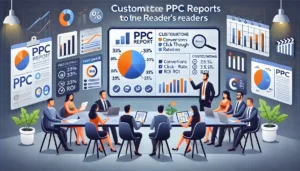Mastering PPC Reports: A Step-by-Step Guide to Impress Clients and Drive Success

Creating a PPC report can feel overwhelming, but fear not! This guide will equip you to transform raw data into insights that impress clients and drive campaign success. Whether you are a seasoned PPC pro or just getting started, this step-by-step guide will help you master the art of PPC reporting.
Mastering PPC Reports: Key Takeaways
- Understand your audience and set clear campaign goals before diving into data.
- Select relevant KPIs that align with your campaign objectives to measure success accurately.
- Craft a compelling narrative to tell the story behind the data and highlight key insights.
- Utilise effective data visualisation tools to create clear and engaging charts.
- Consider automating your PPC reports to save time and maintain accuracy.
Understanding Your Audience and Campaign Goals When Mastering PPC Reports
Identifying Your Audience
Audience research is the process of understanding your target audience’s demographics, psychographics, behaviours, preferences, needs, and pain points. By knowing your audience, you can create more personalised and relevant PPC campaigns that resonate with them and motivate them to take action. Audience research involves the following steps:
- Define your target audience segments: Before you start researching your audience, you need to define your target audience segments based on their characteristics and attributes. You can use different criteria to segment your audience, such as location, age, gender, income, education, occupation, interests, hobbies, lifestyle, etc. You can also use more advanced criteria, such as buyer personas, buyer stages, buyer journeys, etc.
- Collect data on your target audience segments: Next, you need to collect data on your target audience segments and see what they are like, what they want, and what they do. You can use different sources to get data on your audience, such as your own website analytics, CRM, email marketing, social media, surveys, interviews, focus groups, etc. You can also use audience research tools.
- Analyse and interpret your audience data: Once you have collected data on your audience segments, you need to analyse and interpret them to get a deeper understanding of your audience. You can use audience research tools to get reports and visualisations on your audience data and see how they differ from each other and from the general population. You can also use your own analysis and interpretation skills to find patterns, trends, correlations, and anomalies in your audience data.
- Create and test your audience hypotheses: Finally, you need to create and test your audience hypotheses and see how they respond to your PPC campaigns. You can use audience research tools to create and test different audience segments and see how they perform in terms of impressions, clicks, conversions, etc. You can also use your own experimentation and optimisation skills to create and test different ad copies, landing pages, offers, etc.
Setting Clear Campaign Objectives When Mastering PPC Reports
Setting clear campaign objectives is crucial for the success of your PPC campaigns. Without clear objectives, you won’t be able to measure your success or optimise your campaigns effectively. Here are some tips for setting clear campaign objectives:
- Align your objectives with your business goals: Your PPC campaign objectives should align with your overall business goals and support your business strategy. For example, if your business goal is to increase sales, your PPC campaign objective could be to generate more leads or conversions.
- Make your objectives specific and measurable: Your PPC campaign objectives should be specific and measurable so that you can track your progress and evaluate your success. For example, instead of setting a vague objective like “increase website traffic,” set a specific and measurable objective like “increase website traffic by 20% in the next three months.”
- Set realistic and achievable objectives: Your PPC campaign objectives should be realistic and achievable based on your budget, resources, and timeline. Setting unrealistic or unachievable objectives can lead to frustration and disappointment.
- Prioritise your objectives: If you have multiple objectives for your PPC campaign, prioritise them based on their importance and impact on your business. This will help you focus your efforts and resources on the most critical objectives.
Tailoring Your Report to the Reader
When mastering PPC reports, it’s essential to tailor them to the reader’s needs and preferences. Different stakeholders may have different interests and priorities, so it’s important to customise your report accordingly. Here are some tips for tailoring your report to the reader:
- Identify your audience: Before you start creating your report, identify who will be reading it and what their interests and priorities are. For example, a marketing manager may be interested in the overall performance of the campaign, while a financial manager may be more interested in the return on investment (ROI).
- Use relevant metrics and data: Include metrics and data that are relevant to the reader’s interests and priorities. For example, if your reader is interested in the performance of specific ad groups or keywords, include detailed data on those aspects of the campaign.
- Provide context and insights: Don’t just present the data; provide context and insights to help the reader understand what the data means and how it impacts the campaign. For example, explain why certain metrics have improved or declined and what actions you recommend based on the data.
- Use clear and concise language: Use clear and concise language to make your report easy to understand. Avoid jargon and technical terms that the reader may not be familiar with.
- Highlight key takeaways: Highlight the key takeaways from your report to ensure that the reader understands the most important points. Use bullet points, bold text, or other formatting techniques to draw attention to these key takeaways.
Tailoring your PPC report to the reader’s needs and preferences can help you communicate your results more effectively and build trust with your stakeholders.
Selecting Key Performance Indicators (KPIs)
Choosing Relevant Metrics When Mastering PPC Reports
To effectively measure the success of your PPC campaigns, start by identifying the KPIs that align with your business objectives. These could include metrics like click-through rate (CTR), conversion rate, cost per acquisition (CPA), and return on ad spend (ROAS). By focusing on relevant KPIs, you can track the performance of your PPC campaigns effectively.
Aligning KPIs with Campaign Goals
Your KPIs should be aligned with your campaign goals and reflect the value of your PPC efforts. For example, if your goal is to increase sales by 10% in the next quarter, you might focus on metrics like conversion rate and ROAS. Aligning KPIs with your goals ensures that you are measuring what truly matters.
Avoiding Common KPI Pitfalls to Mastering PPC Reports
When selecting KPIs, it’s important to avoid common pitfalls. One common mistake is choosing too many KPIs, which can dilute your focus. Instead, select a few key metrics that provide the most insight into your campaign’s performance. Another pitfall is not regularly reviewing and updating your KPIs to ensure they remain relevant to your evolving business goals.
Remember, the right KPIs can make or break your PPC reporting. Choose wisely and review regularly to stay on track.
Crafting a Compelling Narrative
Telling the Story Behind the Data
Every marketer knows you’re supposed to tell a story, but do you know how to tell a story? Do you know why you’re supposed to tell a story? Do you even truly know what a story is? While many marketing presentations emphasise the value of mythic storytelling, the nuts and bolts of actually constructing a story are never explored. The goal of marketing may be to achieve specific KPIs that
Highlighting Key Insights Whilst Mastering PPC Reports
You’ll learn to leverage the insights gathered from PPC reporting to weave narratives that guide your strategies toward success.
Whether it’s deciphering click-through rates, uncovering conversion trends, or tracking ad performance, you’ll discover how to
infuse your data with context and meaning. In this course, you’ll learn how to:
The art of effective communication • The Socratic Method – You cannot teach, but you can persuade people to learn • Plato’s Cave –
You sell products, but you market ideas • Aristotle’s Six Dramatic Elements – The secret recipe for marketing stories This is for
senior marketers who are tasked with creating effective narratives or guiding others in the process. By the end of the session,
attendees will have gained the knowledge needed to work storytelling into all phases of the buyer’s journey.
Visualising Data Effectively
Creating compelling and data-rich visualisations is crucial for conveying insights effectively. The right visual tools can transform complex data into clear, actionable insights that drive decision-making and highlight the impact of your PPC campaigns.
Mastering PPC Reports Means Choosing the Right Visualisation Tools
Selecting the appropriate tools for your visualisations is essential. Tools like Google Data Studio, Tableau, and Power BI offer robust features for creating custom reports. These tools enable you to tailor the data presentation according to your stakeholders’ needs, making the data more digestible and engaging.
Designing Clear and Engaging Charts
When designing charts, clarity and engagement are key. Use a mix of chart types—bar charts, line graphs, pie charts—to represent different data points effectively. Ensure that your charts are not cluttered and that they highlight the most important insights. For example, reallocating budget from low to high-performing areas could improve ROI by 20%.
Avoiding Common Visualisation Mistakes
Avoid common pitfalls such as overloading charts with too much information or using inappropriate chart types. Keep your visualisations simple and focused on the key insights. Remember, the goal is to make the data easily understandable and actionable for your audience.
Effective data visualisation is not just about making charts; it’s about telling a story that drives action and results.
Automating Your PPC Reports
Benefits of Automation
Automation in PPC reporting can save you significant time and effort. By leveraging tools and software, you can streamline the process of data collection, analysis, and presentation. This allows you to focus on strategic decision-making rather than getting bogged down in manual tasks. Additionally, automated reports can be scheduled to run at regular intervals, ensuring that you and your stakeholders always have up-to-date information.
Tools for Automating Reports
There are several tools available that can help you automate your PPC reports. Google Data Studio, Microsoft Power BI, and Tableau are popular choices among PPC agencies. These tools allow you to create custom dashboards and reports that can be automatically updated with the latest data. For a London PPC agency, using these tools can enhance the efficiency and accuracy of your reporting process.
Maintaining Accuracy in Automated Reports
While automation can greatly enhance efficiency, it’s crucial to ensure the accuracy of your reports. Regularly perform a Google ads audit to verify that the data being pulled into your reports is correct. This involves checking the data sources, metrics, and any calculated fields. By maintaining a high level of accuracy, you can build trust with your stakeholders and demonstrate the value of your PPC management efforts.
Remember, effective PPC reporting is an ongoing process. Continuously monitor and analyse your PPC results, make data-driven optimisations, and adapt your strategies based on the insights gained. By doing so, you can maximise the impact of your PPC campaigns and effectively communicate their value to your stakeholders.
Providing Context and Insights When Mastering PPC Reports
Explaining Campaign Goals and Audience
When crafting your PPC reports, it’s crucial to start by explaining the campaign goals and identifying your audience. This sets the stage for the rest of the report and ensures that your clients understand the purpose behind the data. Clearly outline the objectives, whether it’s increasing brand awareness, driving website traffic, or boosting sales. Knowing your audience helps tailor the report to their needs, making it more relevant and impactful.
Offering Data-Driven Recommendations
Providing actionable, data-driven recommendations is where you can truly shine. Use both qualitative and quantitative insights to inform your suggestions. For instance, reallocating budget from low to high-performing areas could improve ROI by 20%. Similarly, shifting spend from broad to exact match keywords could boost ROI by 11%. Addressing all identified issues could multiply ROI through an exponential effect, with the total identified upside potential being 48%.
Highlighting External Influences on Results
It’s essential to consider external factors that may have influenced your campaign results. These could include market trends, seasonal variations, or even changes in social media algorithms. By acknowledging these influences, you provide a more comprehensive view of the campaign’s performance. This not only adds depth to your report but also builds trust with your clients, as they see you are considering all variables that could impact their success.
Providing context and insights transforms raw data into a compelling narrative that drives informed decision-making.
Communicating Results to Stakeholders
Summarising Key Findings When Mastering PPC Reports
When communicating PPC results to your stakeholders, it’s important to go beyond the numbers. Provide context by explaining the goals of your campaigns, the target audience, and any external factors that may have influenced the results. Additionally, offer insights and recommendations based on the data to demonstrate your expertise and value.
Using Visual Aids for Clarity
PPC reporting is a crucial aspect of any successful PPC strategy. It allows you to measure the effectiveness of your campaigns, identify areas for improvement, and communicate the results to your stakeholders. To ensure accurate tracking and analysis, it’s important to follow a systematic approach.
Tailoring Communication to Stakeholder Needs
Based on their impact and urgency, and assigned responsibilities and deadlines for their implementation. Your PPC audit report should be shared with your team, your management, and your stakeholders, and should be used as a basis for your PPC strategy development and implementation.
Conclusion to Mastering PPC Reports
Mastering PPC reports is an essential skill for any digital marketer aiming to impress clients and drive campaign success. By understanding your audience, selecting the right KPIs, crafting a compelling narrative, and visualising data effectively, you can transform raw data into actionable insights. Remember, PPC reporting is not a one-time task but an ongoing process that requires continuous monitoring and optimisation. By following the steps outlined in this guide, you can ensure your PPC campaigns are not only effective but also clearly communicated to your stakeholders, maximising their impact and demonstrating your value as a marketer.
Frequently Asked Questions About Mastering PPC Reports
What is PPC reporting and why is it important?
PPC reporting involves analysing and presenting data from pay-per-click advertising campaigns to measure their effectiveness. It is important because it helps you understand the performance of your campaigns, make data-driven decisions, and communicate results to stakeholders.
How do I choose the right KPIs for my PPC report?
Choosing the right KPIs involves understanding your campaign goals and selecting metrics that align with these objectives. Common KPIs include click-through rates (CTR), conversion rates, cost per click (CPC), and return on ad spend (ROAS).
What tools can I use to visualise PPC data effectively?
There are several tools available for visualising PPC data, including Google Data Studio, Microsoft Power BI, and Tableau. These tools allow you to create engaging and easy-to-understand charts and graphs.
How can I automate my PPC reports?
You can automate PPC reports using various tools such as Google Analytics, Google Ads, and third-party software like Supermetrics. Automation saves time and ensures that your reports are consistently updated with the latest data.
Why is it important to provide context and insights in PPC reports?
Providing context and insights helps stakeholders understand the reasons behind the data. It involves explaining campaign goals, target audience, and any external factors that may have influenced the results. This adds value to the report and demonstrates your expertise.
How should I communicate PPC results to different stakeholders?
Tailor your communication to the needs of your audience. Use visual aids for clarity and summarise key findings in a way that is relevant to each stakeholder. For example, a client may need a high-level overview, while a marketing team might require detailed metrics and analysis.
Author
Search Blog
Free PPC Audit
Subscribe to our Newsletter
The Voices of Our Success: Your Words, Our Pride
Don't just take our word for it. With over 100+ five-star reviews, we let our work-and our satisfied clients-speak for us.
"We have been working with PPC Geeks for around 6 months and have found Mark and the team to be very impressive. Having worked with a few companies in this and similar sectors, I rate PPC Geeks as the strongest I have come across. They have taken time to understand our business, our market and competitors and supported us to devise a strategy to generate business. I value the expertise Mark and his team provide and trust them to make the best recommendations for the long-term."
~ Just Go, Alasdair Anderson




